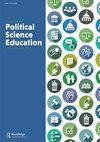The Harmonious Classroom: Teaching Political Theory With Period Music
IF 0.6
Q3 POLITICAL SCIENCE
引用次数: 0
Abstract
Abstract The study of political theory is particularly well suited to pedagogical practices that involve music. Several canonical figures were themselves composers and instrumentalists who cared deeply about their musical commitments. For a notable few, including Plato, Aristotle, and Rousseau, music arguably constitutes an indispensable feature of their respective ideas about politics and the social order. Yet even when music is less central to a thinker’s written work, it remains a useful tool for illustrating historical context and providing a richer understanding of shifting cultural currents. This article explores several considerations that will aid in the selection of music as a way of promoting conceptual clarification and contextual elucidation. While the overwhelming focus on music in the classroom has relied upon contemporary popular music, I prioritize the use of period music, which avoids some potential challenges. The article includes a musical connection rubric intended to help in the selection of music that will prove most effective as a pedagogical tool.和谐课堂:用时代音乐进行政治理论教学
本文章由计算机程序翻译,如有差异,请以英文原文为准。
求助全文
约1分钟内获得全文
求助全文
来源期刊

Journal of Political Science Education
POLITICAL SCIENCE-
CiteScore
1.80
自引率
36.40%
发文量
69
期刊介绍:
The Journal of Political Science Education is an intellectually rigorous, path-breaking, agenda-setting journal that publishes the highest quality scholarship on teaching and pedagogical issues in political science. The journal aims to represent the full range of questions, issues and approaches regarding political science education, including teaching-related issues, methods and techniques, learning/teaching activities and devices, educational assessment in political science, graduate education, and curriculum development. In particular, the journal''s Editors welcome studies that reflect the scholarship of teaching and learning, or works that would be informative and/or of practical use to the readers of the Journal of Political Science Education , and address topics in an empirical way, making use of the techniques that political scientists use in their own substantive research.
 求助内容:
求助内容: 应助结果提醒方式:
应助结果提醒方式:


